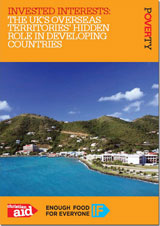Clamp down on UK-linked tax havens key to success of G8

UK-linked tax havens are at the centre of a global financial system that encourages crime, corruption and aggressive tax avoidance in developing countries, reveals a new report by Christian Aid as part of the Enough Food For Everyone IF campaign.
The report highlights for the first time the huge scale of foreign investment routed through the UK’s tax havens to poor countries – and the potential for abuse this causes.
The findings in Invested Interests: The UK’s Overseas Territories’ Hidden Role in Developing Countries underline the urgent need for the G8 to agree a tax deal that benefits poor countries.
Report author Joseph Stead, Christian Aid’s senior economic justice adviser, said: 'The UK as G8 chair has never been in a stronger position to end the grave injustices caused by tax havens – if the UK succeeds in putting its own house in order first.
'The Prime Minister must do everything he can to get UK havens agreed on a tax deal before he arrives in Northern Ireland, so he can push the G8 to end the tax scandal.
'The G8 can start to put an end to tax haven secrecy by agreeing to public registers of the beneficial ownership of all companies and trusts, and making sure developing countries benefit from any tax information deal.'
The report reveals that the British Virgin Islands (BVI), Cayman Islands, Bermuda, Gibraltar, Anguilla and Turks and Caicos - all British Overseas Territories - together with the Crown Dependencies of the Isle of Man, Jersey and Guernsey are now the largest source of Foreign Direct Investment in developing countries.
The amount totalled US$556bn by 2011, the most recent year for which we have figures, and accounted for one in every ten US dollars of foreign direct investment made there.
This figure is concerning because investment is often structured through such jurisdictions specifically to enable tax dodging in poor countries. Other abuses they facilitate include the laundering of crime money, and ‘round tripping’, in which money originating in the developing country where it is to be invested is sent offshore and then returned disguised as foreign funds to qualify for major tax breaks.
'All countries need foreign investment, particularly those fighting hunger and acute poverty,' added Mr Stead. 'But this needs to be genuine and bring real benefits, not money disguised for tax purposes to enrich the already wealthy, illicit money laundered to bestow legitimacy on the corrupt, or investment designed to shift profits out of developing countries.
'We need to clamp down on tax havens and launch a convention on tax transparency to stop the flow of billions of pounds out of developing countries – money that could be used to end hunger.'
The report finds that the British Virgin Islands alone was the fourth largest investor to developing countries in 2011, with the amount involved US$388bn. Globally it provides investment more than 860 times the size of its own GDP.
That same year it was revealed that 45 newly incorporated companies in the BVI had acquired mining assets in the Democratic Republic of Congo at a loss, it was claimed, to the DRC’s economy of US$5.5bn. The identity of those behind the companies remains secret.
Former UN secretary-general Kofi Annan warned recently that foreign investors making extensive use of tax havens ‘facilitate tax evasion, and in some cases corruption.’
Enough Food for Everyone IF is a coalition of nearly 200 organisations that have joined together to campaign for action by the G8 on the issue of global hunger. It estimates that developing countries lose some US$160bn of tax revenues a year from multinationals shifting profits offshore before they can be taxed.
For more information visit: www.christianaid.org.uk


















